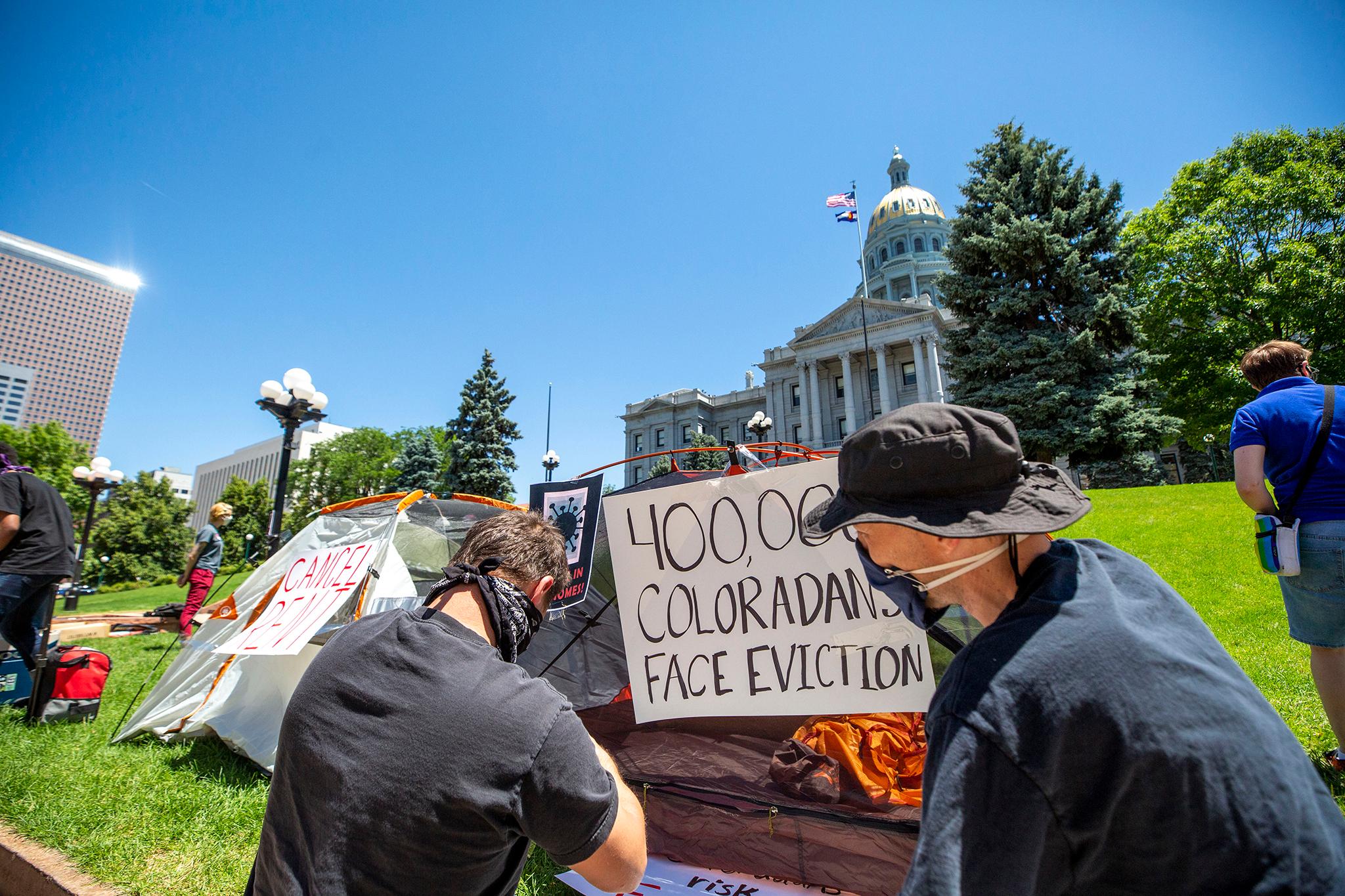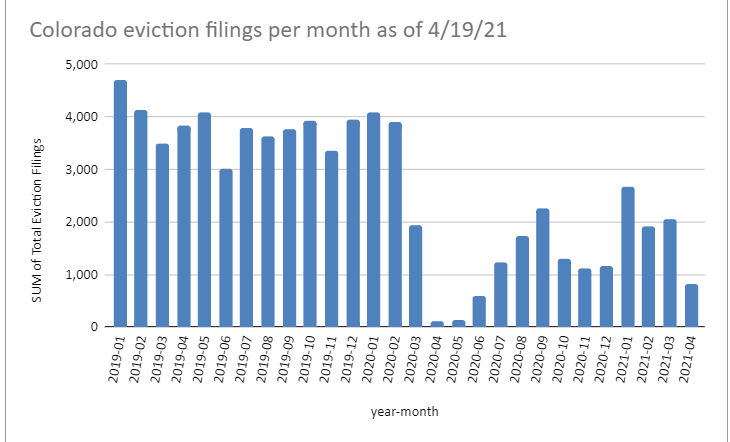
Updated on Oct. 15, 2021: The national pause on evictions issued by the Centers for Disease Control And Prevention has expired and state protections for renters in Colorado have also ended.
The ground is about to shift beneath renters and landlords in Colorado once again. The national moratorium on evictions has expired and the remaining state protections for renters that were in place through executive order have also ended.
That means landlords can start moving forward with evictions regardless of whether a tenant has applied for aid through a rental assistance program. Landlords now need to provide only 10 days' notice before filing for an eviction. But a new state law that requires landlords to accept overdue rent before a judge orders an eviction could provide some relief to those behind on rent.
As the state continues its return to normal, confusion is aplenty about what kind of support both renters and landlord will have going forward, especially as many continue struggling with the state's identification system for it's unemployment benefits, ID.me.
Here are the answers to the most common questions we’ve heard about evictions, housing assistance and more in Colorado.
Where can I get help with my rent or mortgage?
People facing eviction are eligible for financial help from the federal government. That money’s being distributed through the Colorado Emergency Rental Assistance Program for people who make less than 80% of the “area median income” where they live. (Check here.) ERAP can give people money for the rent they already owe, plus two future months.
The state programs can also offer help for homeowners, but that funding is currently paused.
If you need more guidance, contact the state-sponsored Housing Counseling Assistance Program at 844-926-6632 or at ColoradoHousingConnects.org.
Is legal aid available?
People facing evictions can ask for free legal help from an attorney through the COVID-19 Eviction Defense Project, a private community effort. Similar help is available through Colorado Legal Services, 9to5Colorado and the Colorado Poverty Law Project.
Various nonprofits and local governments offer different forms of help with rent and other bills. For example, Denver residents can apply for direct cash assistance from the city. The state has a map of eviction prevention programs across Colorado.
The website OnwardCO has a list of services that provide food, medical care and more. The state PEAK service can provide food, cash assistance and more. The state-run LEAP program offers help with energy bills during the winter. Mile High United Way also runs a 2-1-1 service to connect people with aid and assistance. The Family Resource Center Association has partners across Colorado that can help.
The GES Coalition has a Spanish and English-language guide to housing resources in Denver.
The Colorado Apartment Association has also been raising funds to assist tenants who fall behind on rent. Renters can apply for that help through the Resident Relief Foundation.
What can landlords do?
Landlords and other property owners may be able to seek forbearance from their mortgage lender. If the lender agrees, the landlord can delay their monthly mortgage payments. For federally backed loans — including those affiliated with the VA, USDA and HUD — the deadline to apply was June 30. There is no current deadline to ask for forbearance on mortgages backed by Fannie Mae or Freddie Mac. Here’s how to tell if your loan is federally backed.
Can landlords evict tenants in Colorado right now?
Yes. Landlords have been able to pursue evictions in Colorado during most of the pandemic. But tenants have had a variety of protections that can halt the process in certain cases, though those protections have now ended.
Court documents show that there have been waves of attempted evictions throughout the last year. Landlords have filed about 17,000 eviction cases since April 2020, a far lower rate than the state saw before the pandemic.

But filings alone don’t reflect the actual number of removals. In some cases, people may leave their home to avoid the court battle — an “informal” eviction. In others, a judge may stop the eviction.
For example, landlords have filed more than 3,000 eviction cases in Denver in the last year, which has resulted in about 700 removals by sheriff’s deputies. In Jefferson County, about 1,500 eviction filings resulted in about 380 removals during the pandemic.
Is the CDC evictions moratorium still in effect in Colorado?
No, the national moratorium expired on July 31.
Do renters still have to pay rent in Colorado?
Yes. The CDC moratorium, when it was active, said that renters must keep making their best efforts to pay rent.
Failure to pay rent also means that the tenant is building up a debt to their landlord. That debt could be grounds for eviction now that the moratorium is expired. And that debt can follow renters even after they leave a property. Some landlords will send rental debt to collections agencies, which can damage renters’ credit and hurt their ability to find new housing or take on other debt.
Can I be charged late fees in Colorado?
Yes. For a while, the state banned landlords from charging late fees. But it has been allowed again since late April because Polis let an order lapse. Late fees can be assessed for any month going forward, but they cannot be issued retroactively for earlier months. Some large apartment buildings have begun warning that they will issue late fees again. A new law could curb some of those fees. For example, the law prevents landlords from charging a fee on late rent if the payment is not more than seven days late, and fees cannot total more than $50 or more than five percent of the owed rent.
How can I tell if I’m facing eviction?
If you’re unsure whether your landlord is pursuing eviction, you could ask them whether they have posted a demand for rent. You should also call your county court to check whether the landlord has filed an eviction against you. A list of county courts and contact information is available online. If you’re not sure what county you live in, check online.
What is the eviction process right now?
First, a landlord has to give a printed notice to the tenant that outlines a demand for payment, and instructs the tenant that they must pay or leave the property by a certain date 10 days before filing for an eviction. It can also outline other reasons for eviction.
If the tenant hasn’t cured the problem by the end of the notice period, then the landlord can file a case in court. At this point, it becomes much more difficult for a tenant to avoid eviction.
A hearing will likely be scheduled before a judge, who will consider and decide on the case. If the tenant fails to appear, they may automatically lose the case.
If the judge decides that the renter can be evicted, the case then goes to the local sheriff’s department. After 48 hours have passed, the judge can issue a writ, which allows law enforcement to take action. Deputies from the sheriff’s department can then forcibly remove a person at any time, although the timelines can vary a lot.
Under a new state law, however, landlords must accept a tenant's overdue rent as long as it is paid before a writ is issued by a judge.
Evictions and eviction court cases can remain on a person’s record, making it more difficult to rent future housing.









